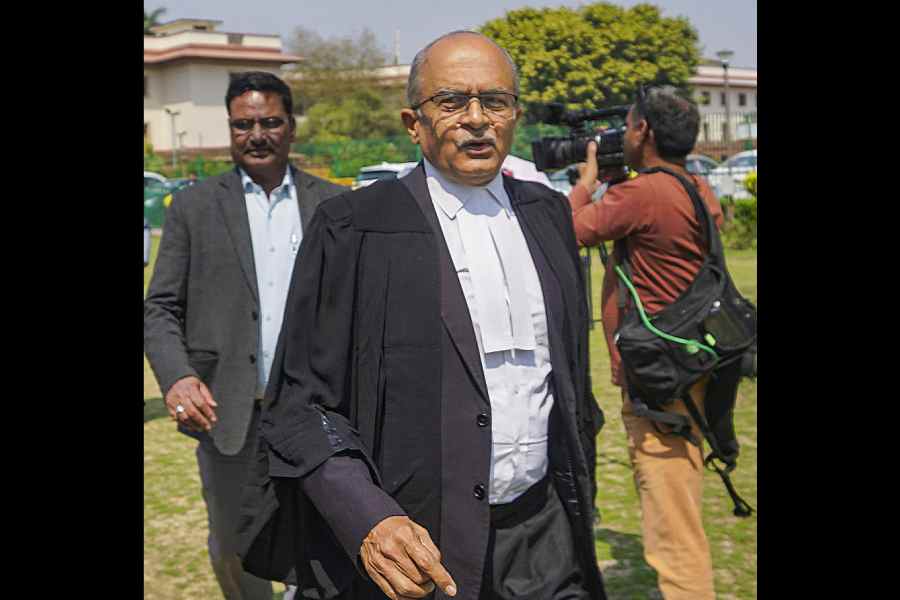The electoral bonds represented a “racket” of extortion, quid pro quo and rule-bending that mostly favoured the BJP, the NGOs whose petition led the Supreme Court to scrap the scheme, an advocate and a media personality alleged on Friday.
They said the BJP was the biggest beneficiary of electoral bonds paid by loss-making companies and certain corporate groups that made donations after being raided by central investigating agencies.
Several companies bagged huge government contracts after donating via electoral bonds, which allowed donors and recipients to remain anonymous, they added.
Jagdeep S. Chhokar, founder-member of the NGO Association of Democratic Reforms (ADR), Anjali Bhardwaj from the NGO Common Cause, advocate Prashant Bhushan and Nitin Sethi from The Reporters’ Collective told a news conference that the electoral bond scheme was a mammoth scam.
Citing data on the bonds that the Supreme Court forced the State Bank of India to reveal this month, they made several allegations:
⦿ Sixteen companies that had made no profit in the preceding three years paid a combined Rs 710 crore through the electoral bonds, with the BJP receiving Rs 460 crore of this amount, Sethi said. Under the old rules of political donation before the electoral bonds’ introduction in 2018, these companies could not have donated any money to any party.
⦿ Under the rules of the scheme, electoral bonds had to be cashed within 15 days of their issuance. Else, the funds were to go to the Prime Minister’s Relief Fund. Sethi alleged that the SBI had consulted the finance ministry about a request for encashment of a bond after the 15-day deadline, and the ministry gave its nod. The funds were meant for the BJP, Sethi said.
“The scheme was made to help the party in power at the Centre. Crony capitalism proliferated; it got a legal cover,” he said.
⦿ Bhushan said certain companies paid the BJP a total sum of Rs 1,751 crore through electoral bonds and received government contracts worth Rs 62,000 crore.
⦿ Forty-one groups of companies paid the BJP a sum of Rs 2,471 crore via the bonds after facing raids from the CBI, Enforcement Directorate and income-tax authorities, Bhushan alleged.
Bhushan said that 50 per cent of the total donations received through the electoral bonds had gone to the BJP. He, however, speculated that some other parties with governments in the states may have resorted to similar tactics of awarding contracts to companies against heavy donations.
“The electoral bond scheme is an extortion racket. There should be an independent investigation. The CBI and the ED cannot do this; a special investigation team should be set up,” he said.
Bhushan said that unlike with the electoral bonds, no money trail had been established in the 2G and coal-block scandals of the UPA era, which related to allegedly illegal award of government licences.
Union home minister Amit Shah recently said the average donation the BJP had received per MP was lower than the average donation per MP for the other parties collectively.
Bhushan argued that “illegitimate” donations cannot be justified by citing party strength in the Lok Sabha. He added that how much money a party needs to fight elections depends on the number of seats it contests and not the number it wins.
Chhokar said: “A corporate-political nexus is very clear from the data that have come after the Supreme Court direction. If there is such a nexus, what will happen to the poor?”
Bhardwaj, who is also part of a National Campaign for People’s Right to Information, said the electoral bond scheme denied citizens the right to know which company was paying how much to which political party.
The data revealed relates to the period since April 12, 2019, during which political parties received a combined donation of Rs 12,500 crore through the bonds.
However, details of the Rs 4,000 crore worth of bonds issued between March 1, 2018, and April 11, 2019, have not been revealed, with the apex court dismissing petitions seeking such disclosure.
Bhardwaj demanded that the details of these electoral bonds, too, be revealed.
She said the revelations had raised questions about the functioning of the investigating agencies since many donations arrived after raids. She said there was a clear quid pro quo since many companies received big contracts after making large donations.










